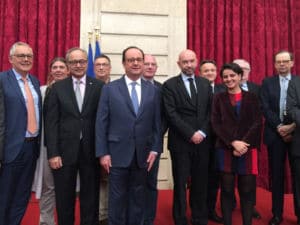Success for the Montpellier University of Excellence project!
This is a major success for the entire Montpellier scientific community and a wonderful recognition of its potential and projects. After its hearing before an international jury on February 21, the Montpellier University of Excellence (MUSE) project was awarded the Initiatives – Science – Innovation – Territories – Economy (I-SITE) label. 
The General Commission for Investment (CGI) has decided to allocate €550 million to the project led by the University of Montpellier: €350 million for new MUSE initiatives and €200 million to ensure the long-term future of LABEX. This allocation is equivalent to IDEX funding.
Based around the University of Montpellier, the project involves 10 research organizations (BRGM-CEA-Cirad-CNRS-Ifremer-Inra-Inria-Inserm-IRD-Irstea), four schools (ENSAM-ENSCM-EMA-SupAgro), three healthcare institutions (Montpellier University Hospital-Nîmes University Hospital-Montpellier Cancer Institute), and one international organization (CIHEAM-IAMM).
More than 150 partners support MUSE and are committed to investing more in university-business partnerships: SMEs, large groups (including five key partners: Banque Populaire du Sud, BRL, Horiba, Invivo, and MSD) and competitiveness clusters (Derbi, Eau, Eurobiomed, Mer, Optitec, Qualiméditerranée, and Trimatec).
Horiba played a particularly decisive role, as its Chairman & CEO, Dr. Jai Hakhu, participated in the hearings before the international jury. It will continue to play a key role in the future, as Dr. Hakhu has also agreed to participate, alongside the four other privileged partners, in the advisory bodies that will monitor the progress of the project.
A scientific ambition reinforced
This result reinforces the ambition of the MUSE project, the largest scientific project ever conceived at the Montpellier site, to address three major challenges for the 21st century: feeding, protecting, and caring for people."By betting on Montpellier's strength in the fields of life sciences, the environment, and agriculture, and providing a collective response to these three interdependent challenges, MUSE has played the winning card,"says Philippe Augé, President of the University of Montpellier. Through research, training, and innovation, MUSE will engage in the conquest of new scientific and economic spaces and contribute to food security, the sustainable management of natural resources and ecosystems, and the improvement of treatments for emerging infectious diseases, chronic diseases, and cancers.
“Muse aims to elevate Montpellier to international prominence in health, environmental sciences, and agriculture.”
The project involves 10 research organizations (BRGM-CEA-Cirad-CNRS-Ifremer-Inra-Inria-Inserm-IRD-Irstea), four schools (ENSAM, ENSCM, EMA, SupAgro), three healthcare institutions (Montpellier University Hospital, Nîmes University Hospital, Montpellier Cancer Institute), and one international organization (CIHEAM-IAMM).
An exceptional presence in the South reinforced
With 400 researchers currently permanently based in the intertropical zone, Muse has a network and expertise that is unmatched anywhere in the world in the countries of the South, thanks in particular to the know-how of CIRAD, IRD, and CNRS. As France's leading national center for agro-environment-biodiversity, Montpellier is now the French leader in research on new agricultural models and environmental management. Similarly, the Montpellier site is a benchmark for the study of emerging infectious diseases and transmission vectors. These are two issues that primarily concern countries in the Global South and are at the heart of the certified project.
Montpellier is now the French leader in research on new agricultural models and environmental management.
A recognized dynamic of cooperation that is set to accelerate
With its 6,000 scientists and 50,000 students, the MUSE project enjoys the active support of the Occitanie / Pyrénées-Méditerranée Region and Montpellier Méditerranée Métropole
The creation of an internationally recognized thematic research university capable of generating positive momentum across all scientific communities (not only those in agronomy, ecology, and biology, but also in chemistry, hard sciences, engineering, and social sciences) is indeed a strategic asset for the development of the region. In addition, more than 150 partners supported MUSE in its bid for certification and committed to investing more in university-business partnerships: SMEs, large groups (including five privileged partners: Banque Populaire du Sud, BRL, Horiba, Invivo, and MSD) and competitiveness clusters (Derbi, Eau, Eurobiomed, Mer, Optitec, Qualiméditerranée, and Trimatec). The objectives are to set up world-renowned joint laboratories, send research teams to campuses, co-develop courses tailored to the challenges of tomorrow, and co-build European projects.
Obtaining I-SITE certification will enable the partnership between socio-economic stakeholders and MUSE's center of scientific excellence to be strengthened.
Muse: funding equivalent to IDEX funding
The General Commission for Investment (CGI) has decided to allocate €550 million to the project led by the University of Montpellier: €350 million for new MUSE initiatives and €200 million to ensure the long-term future of LABEX. This grant is equivalent to IDEX funding.
As the overall grant is non-consumable, the interest generated by the grant, i.e., €17 million, will be used each year to fund MUSE initiatives (€10.5 million) and LABEX (€6.5 million).
This funding will be supplemented by the Occitanie/Pyrénées-Méditerranée Region, which, following the recent establishment of its SRESRI (Regional Higher Education Research Plan), has committed to contributing to certain MUSE initiatives.
17 million euros will be allocated each year to the MUSE project (10.5 million euros) and LABEX funding (6.5 million euros).